Kombucha is created by fermenting tea with a “scoby”—a combination of bacteria, yeast and sugar—which produces probiotics and organic acids that improve digestion, boost the immune system and so much more.
But if you’re not able to get your hands (or stomach) on kombucha, there are plenty of alternatives that can provide some similar benefits.
This article will explore the top five best substitutes for kombucha, so you can still get all of the nutrients necessary to stay healthy without having to buy expensive or hard-to-find beverages.
We’ll discuss what makes each option unique and why it can be beneficial in place of kombucha.
First, let’s review a few key reasons why you might want to consider replacing your kombucha with one of these options.
What is Kombucha?
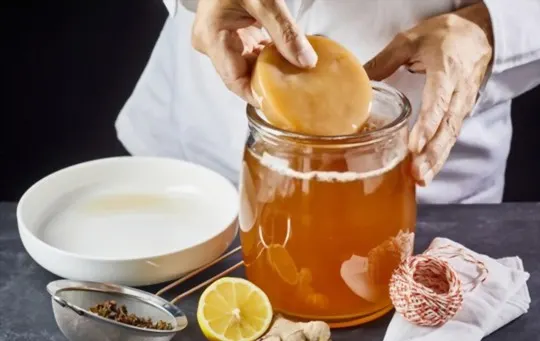
Kombucha is a lightly-fermented tea that has become increasingly trendy among health-conscious folks.
It’s made by fermenting tea with a SCOBY––symbiotic culture of bacteria and yeast––which gives it an effervescent touch.
Although its flavor may take some getting used to, people swear by its many benefits like improved digestion, better nutrient absorption, and liver cleansing properties.
Even though the exact process and origins of this drink are unclear, its popularity continues to rise as more people discover its health advantages.
Those interested in giving Kombucha a try can find it in stores or brew their own using ingredients like green or black tea, white sugar and the aforementioned SCOBY—which can be bought online at most brewing websites.
When Should You Drink Kombucha, and How Much?
Kombucha is a naturally occurring beverage, made with a combination of tea and a special symbiotic culture of bacteria and yeast.
It has become increasingly popular over the last few years as people are looking for healthier choices than many sugary sodas.
When consumed in moderation, kombucha can offer numerous health benefits.
Kombucha is generally safe to drink anytime, as long as you abide by the following guidelines:
- Drink no more than 16 ounces per day.
- Do not drink on an empty stomach or after eating a large meal.
- Do not combine with high amounts of alcohol or caffeine.
- Wait at least two hours after drinking coffee before consuming kombucha.
It’s also important to keep in mind that kombucha contains both natural sugars and alcohol, so drinking too much can be harmful to your health.
To get the most benefits from this beverage it’s best to consume it in moderation and combine it with other healthy habits such as exercise, good nutrition and plenty of sleep.
5 BEST Kombucha Substitutes You Should Consider
It has a powerful probiotic effect and many health benefits associated with it, but is not for everyone.
That’s why there are several great substitutes for kombucha available, each offering its own unique benefits.
Here are five of the best alternatives to kombucha that you can try to get healthier without having to buy expensive.
1 – Water Kefir
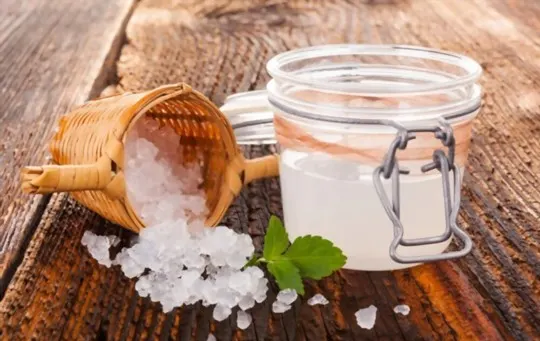
Water Kefir is a probiotic-rich and carbonated beverage made by fermenting sweetened water and grains.
This fermentation process creates a natural tartness, along with a slightly fizzy drink.
You can customize the flavor of Water Kefir by adding various fruits, spices and herbs.
Similar to Kombucha tea, Water Kefir is full of beneficial live organisms that promote great gut health.
This makes it a great natural way to boost your immune system, improve digestion and support proper absorption of nutrients.
The ingredients used in creating Water Kefir are super simple — all you need is water with some sugar or other sweetener, kefir grains and some kind of flavoring (like fruit).
It’s also important to use filtered or spring water as chlorine can interfere with the fermentation process.
The entire brewing process takes around one to three days before you can enjoy your delicious creation.
2 – Kvass
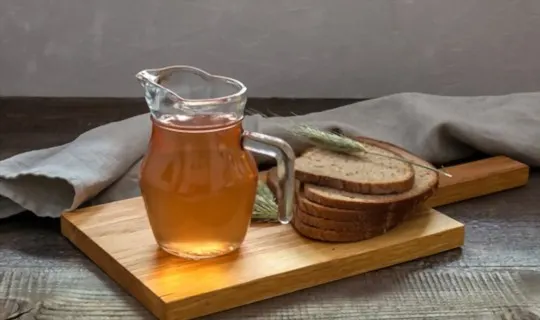
Kvass is a traditional Slavic and Baltic fermented beverage made from rye or barley bread and is popular in Ukraine, Russia, and other European countries.
It has a slight sour taste with a hint of sweetness that offers many beneficial compounds like probiotics, vitamin B, and minerals.
It helps keep your digestion healthy and is used to treat various stomach ailments.
Kvass has a relatively low alcohol content of 1-2% though some varieties may contain higher alcoholic content.
If you are looking for an alternative to kombucha that you don’t need to worry about fermenting yourself, kvass could be the perfect one for you as it can easily be found in stores.
3 – Rejuvelac
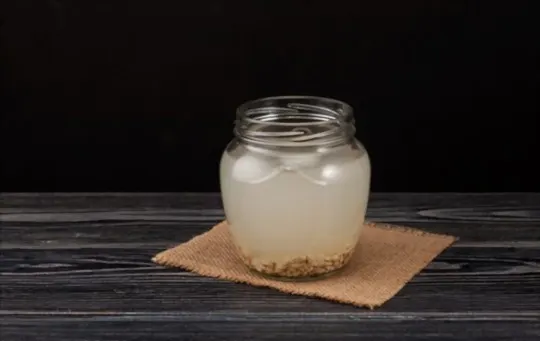
Rejuvelac is a fermented drink made from wheat kernels that are soaked in water and rinsed every 8-12 hours until they begin to sprout.
This beverage is left to ferment for up to 7 days, depending on the temperature of the environment, before being strained through a cheesecloth and cheesewood and served either chilled or at room temperature.
Rejuvelac has little to no sugar, so you can get all the probiotic benefits without the sugars commonly found in other fermented drinks.
With 3g of protein per 180ml serving and with added B-vitamins through the fermentation process, Rejuvelac provides many health benefits including immune system support, improved digestion and detoxification support.
As an added bonus for those looking for vegan alternatives more Zinc than what you would find in many dairy products such as yogurt.
4 – Ginger Ale

Ginger ale is often seen as a healthier alternative to other carbonated drinks due to the presence of ginger, which is known for its numerous health benefits.
It is also often sweetened with fruit juice or honey, and therefore has fewer calories than many other forms of soda.
For an added bonus, try adding a little bit of fresh ginger for more flavor and health benefits.
Ginger ale can be used as a 1:1 substitute for Kombucha in most recipes, although it won’t have the same probiotic benefits.
5 – Boza
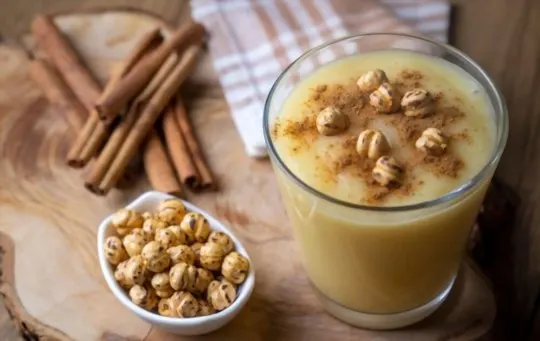
Kombucha is a fermented tea made with natural ingredients, such as black or green tea, that has become a popular part of many people’s diets over recent years.
Its health benefits come from the probiotics contained in the drink.
But what if you can’t find kombucha? What are your alternatives? In this article, we look at five of the best substitutes for kombucha.
Boza has been around for centuries and is known to be popular in parts of Eastern Europe and among certain communities in the Middle East.
It is made by fermenting grains, as opposed to tea.
Boza has a thick, creamy consistency that makes it especially well-suited for use in smoothies or thick shakes and its probiotic content is comparable to that found in kombucha.
It is made with barley, wheat, maize or millet and is often served sweetened with sugar or honey for enhanced flavor.
Conclusion
Kombucha is a prebiotic, fermented tea drink full of probiotics, antioxidants and enzymes that offer vast health benefits.
It has high levels of vitamin B and various beneficial acids.
Unfortunately, due to its unique flavor profile, Kombucha can be difficult to acquire or acquire a taste for.
Luckily, there are plenty of other beverages out there that have similar benefits as Kombucha.
By understanding which nutrients and vitamins you’re looking for in these great alternatives, you can get all the healthy benefits of Kombucha without the flavor challenge.
Whether you opt for one of these drinks or any other probiotic-rich beverage on the market today – go forth and experience better digestion with glowing skin as bonus points.
Don’t forget to pay attention to how each drink’s flavor (and other attributes) affect your personal experience.
Frequently Asked Questions
Q: What is Kombucha?
A: Kombucha is a fermented tea that is made through a process of steeping tea leaves in water and sugar, then adding a symbiotic culture of bacteria and yeast (SCOBY).
It is a probiotic-rich beverage that has been enjoyed for centuries.
Q: What are the 5 best substitutes for Kombucha?
A: The 5 best substitutes for Kombucha are: 1) Kefir, 2) Coconut Water Kefir, 3) Jun Tea, 4) Ginger Beer, and 5) Apple Cider Vinegar.
Q: What are the benefits of drinking Kombucha?
A: Kombucha is rich in probiotics, which can help to improve digestion and boost the immune system.
It is also a source of antioxidants and other beneficial compounds that can help to promote overall health.
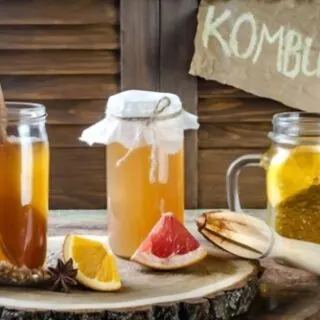
5 BEST Kombucha Substitutes You Should Consider
Ingredients
- 1 – Water Kefir
- 2 – Kvass
- 3 – Rejuvelac
- 4 – Ginger Ale
- 5 – Boza
Instructions
- Choose your preferred substitute from the list of options.
- Organize all of your ingredients.
- Use the proper substitute to cook your recipes.

Carrie is a food writer and editor with more than 15 years of experience. She has worked for some of the biggest names in the food industry, including Bon Appétit, Food & Wine, and Martha Stewart Living.
As the Editor in Chief of IntroChicago.com, Carrie oversees all of the content on the site. She also manages the team of contributing writers and editors, who help to create delicious recipes, helpful tips, and informative articles that you’ll find on the site.
A native of the Chicago area, Carrie is passionate about all things food. She loves trying new restaurants and experimenting with new recipes in her kitchen. She’s also a graduate of the Culinary Institute of America, so she knows a thing or two about food!
